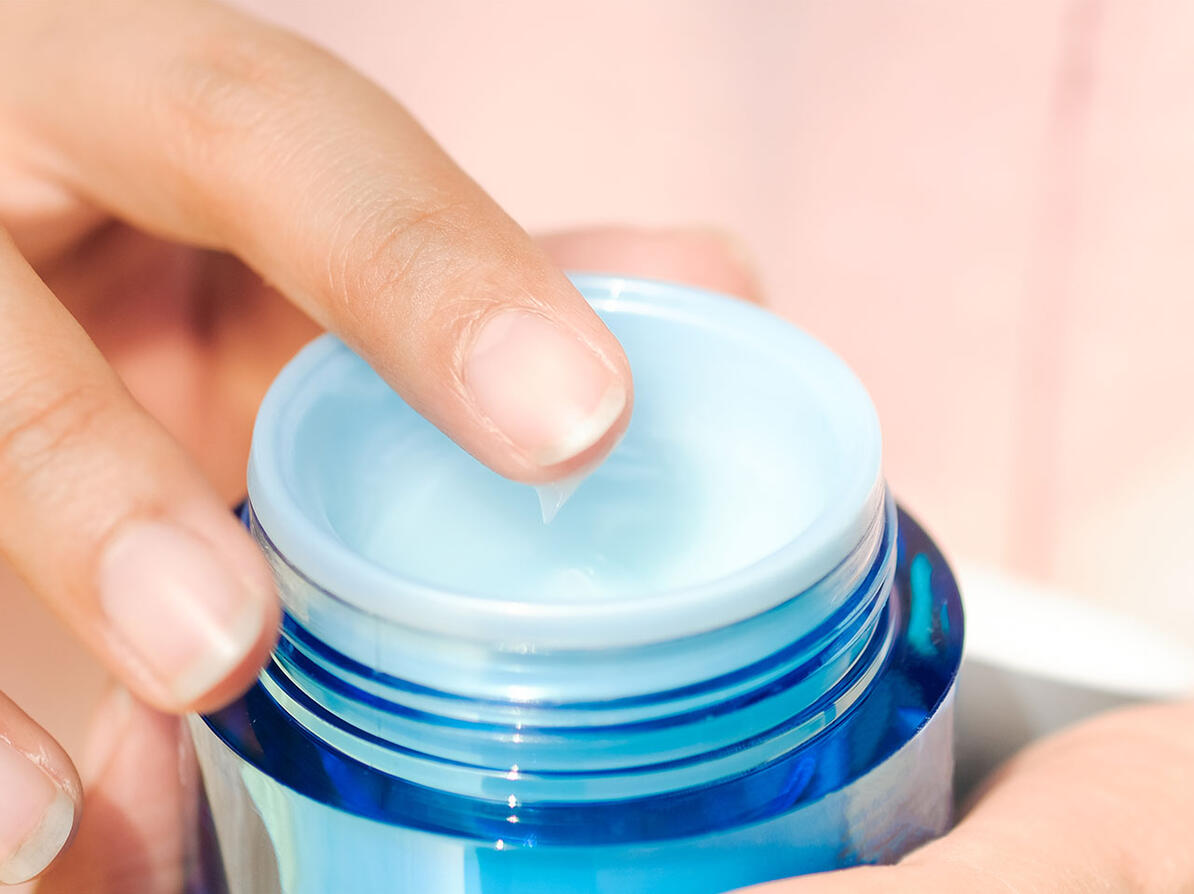Test of chemicals in face creams
Face creams may contain fluorinated and other problematic substances. Fortunately, there are several good chemical choices in the test when choosing a face cream.

Many good choices of face creams
The test of 62 face creams focus on substances suspected of being endocrine disrupting, allergenic, or which are harmful to the environment.
The test shows that you can find many good chemical choices among popular face creams.
27 face creams get the best chemical rating A. Among these, creams are marketed specifically for men, for women and for everyone.
There are creams both with and without eco-friendly and allergy labels among the good choices.
Face creams with unwanted chemicals
Just under a third of the creams in the test contain substances suspected of being endocrine disrupting, allergenic or harmful to the environment.
The substances are permitted and it is not the individual product that is the problem.
However, cosmetics and care products come into direct contact with the skin and can therefore contribute to our overall exposure to unwanted chemicals - the so-called cocktail effect.
If you want to reduce your overall exposure to problematic chemicals, you should choose face creams without problematic substances.
Particularly problematic siloxanes in several creams
Two of the undesirable substances found in several creams in the test are cyclopentasiloxane and cyclohexasiloxane.
Both substances are on the EU's list of substances of very high concern because they are harmful to the environment. Cyclopentasiloxane is also suspected to be endocrine disrupting.
Nevertheless, both substances are allowed in many cosmetics and care products, such as face creams.
Fluorinated substances are still found in cosmetics and care products
Several face creams in the test also contain fluorinated substances.
Fluorinated substances can, among other things, give the products the right texture, help to smooth the skin or make the products more durable once they have been applied.
However, fluorinated substances are problematic for the environment as they accumulate in nature.
They can also be problematic for your health because they can accumulate in the body and they are suspected to lead to increased health problems ranging from risk of cancer to a weakened immune system and hormonal disorders.
Nevertheless, we still find fluorinated substances in cosmetics and care products, including face creams.
About the test
-
How we tested
The focus of this test is regular face creams in different price ranges. Included in the selection are both face creams marketed for men, for women and for both sexes.
All face creams in the test are purchased in August 2021. After purchase, product names and ingredient lists are sent to the manufacturers to check that the products were not outdated and that the ingredient lists were correct.
The test is a declaration test. I.e., it is a review of the ingredients that appear on the product ingredient lists. Thus, we have not tested the products with chemical analysis in a laboratory or tested how well they moisturize or care for the skin on the face.
We have assessed the ingredients of the face creams in relation to whether they are, for example, suspected of being endocrine disrupting, allergenic or problematic for the environment.
In the app Kemiluppen you will find reviews of many more face creams. The rating of the face creams in this test is identical to the rating of creams in Kemiluppen.
See all test from The Danish Consumer Council THINK Chemicals
What we found
62 face creams are included in the test and distributed as follows:
- 27 creams get best chemical rating A.
- 16 creams get average chemical rating B. This is due to the content of perfumes or substances that can be problematic for the environment.
- 19 creams get the lowest chemical rating C. They contain one or more substances suspected to be endocrine disruptors or substances that are problematic for the environment.
We found these unwanted substances in the face creams
Substances that the Consumer Council THINK Chemicals considers undesirable in the examined face creams:
- Benzyl salicylate is a perfume substance suspected to be endocrine disrupting. Found in 6 face creams.
- Cyclopentasiloxane is a silicone substance suspected to be endocrine disrupting. It is also harmful to the environment as it accumulates in nature. Found in 4 face creams.
- Cyclohexasiloxane is a silicone substance that is harmful to the environment as it accumulates in nature. Found in 5 face creams.
- BHT is an antioxidant suspected to be endocrine disrupting. Found in 4 face creams.
- Butylphenyl methylpropional is a perfume substance suspected to be endocrine disrupting and to be able to damage our fertility. Found in 2 creams.
- Salicylic acid suspected to be endocrine disrupting and to impair fertility. Found in 2 creams.
- Benzophenone-4 is a UV filter suspected to be endocrine disrupting. Found in 2 creams.
- Sodium salicylate suspected to be detrimental to our fertility. Found in 1 cream.
- Ethylhexyl salicylate suspected to be endocrine disrupting. Found in 1 cream.
- Parabens (ethyl and methyl paraben) are preservatives suspected to be endocrine disruptors. Found in 1 cream.
- fluorinated substances of various kinds are problematic for the environment and suspected of having undesirable effects on health. Found in 8 creams.
We found the following fluorinated substances in the creams
- Polyperfluoromethylisopropyl ether
- ptfe
- Perfluorodecalin
- Polyperfluoroisopropyl ether
- tetradecyl aminobutyroylvalylaminobutyric urea trifluoroacetate
- Acetyl trifluoromethylphenyl valylglycine
Consider whether these substances should be in your face cream
You may want to consider finding products without substances that trigger a B rating. The face creams are as follows:
- Perfume that can cause allergies. It may therefore be a good idea to limit how much perfume you are exposed to overall. The same goes for plant extracts that can cause allergies. Some of the perfume substances, such as limonene, can also be problematic for the environment.
- EDTA compounds that can release heavy metals otherwise bound in nature. The substance is not permitted in eco-labeled products
-
Nu Skin
"At Nu Skin, we manufacture all our products very carefully. Years of scientific experience and innovation are behind our formulas. Nu Skin Nutricentials Moisturize Me Intense Hydrating Cream complies with EU legislation for cosmetic products, which with its strict safety requirements protects consumers. As required by law, Nu Skin undertakes to disclose the ingredients in the cream in order to ensure transparency for the consumer and provide sufficient information, among other things, so they can avoid ingredients that may give them an allergic reaction. At the same time, Nu Skin keeps a close eye on the latest research and available scientific data, including on substances that deserve special attention because of their impact on consumer health and the environment. With consumers' needs in mind, we assess alternative solutions and implement where possible. " -
Use the Kemiluppen app to scan face creams that are not included in the test.
Several more rated face creams is available in the Kemiluppen app than what is included in this review of face creams.
Choose Nordic Swan Ecolabelled creams
Then you are sure to get creams without a number of problematic substances for both the environment and health.
The Nordic Swan Ecolabel also does not allow fluorinated substances or problematic siloxanes.
Go for the allergy labels or 'perfume free' if you want to be sure to get a cream without perfume
The claims "sensitive" or "hypoallergenic" are not a guarantee that the cream is perfume-free. In the test, several perfumed face creams have these claims.
"Free of synthetic perfume" is also not enough if you want to avoid perfume substances that can cause allergies. Natural perfume substances can be just as allergenic as the synthetic ones.
Consider whether you need sunscreen in your face cream
The tested face creams are all without sun protection. Nevertheless, face creams can contain sunscreens, which are supposed to provide protection from the sun's UV rays.
However, several sunscreens can be problematic for the environment or suspected of being endocrine disruptors.
In Denmark, the amount of sun is limited - especially during wintertime. If you, at the same time, are very much indoors, sunscreen in creams is rarely necessary.
Therefore, use sunscreen when you need sun protection.
